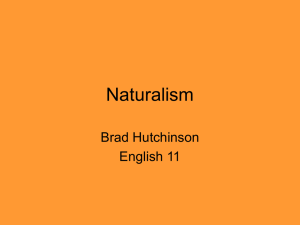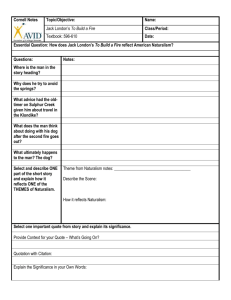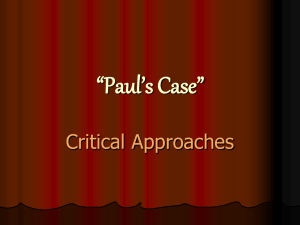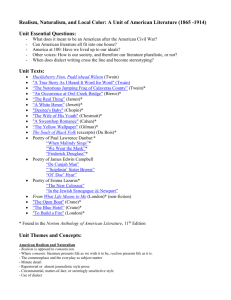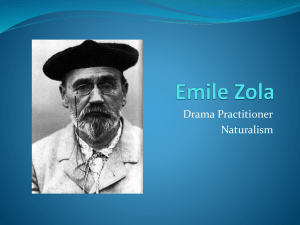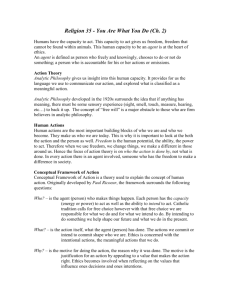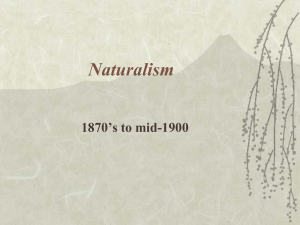Darwinian influence on Naturalism demonstrated on Jack London
advertisement
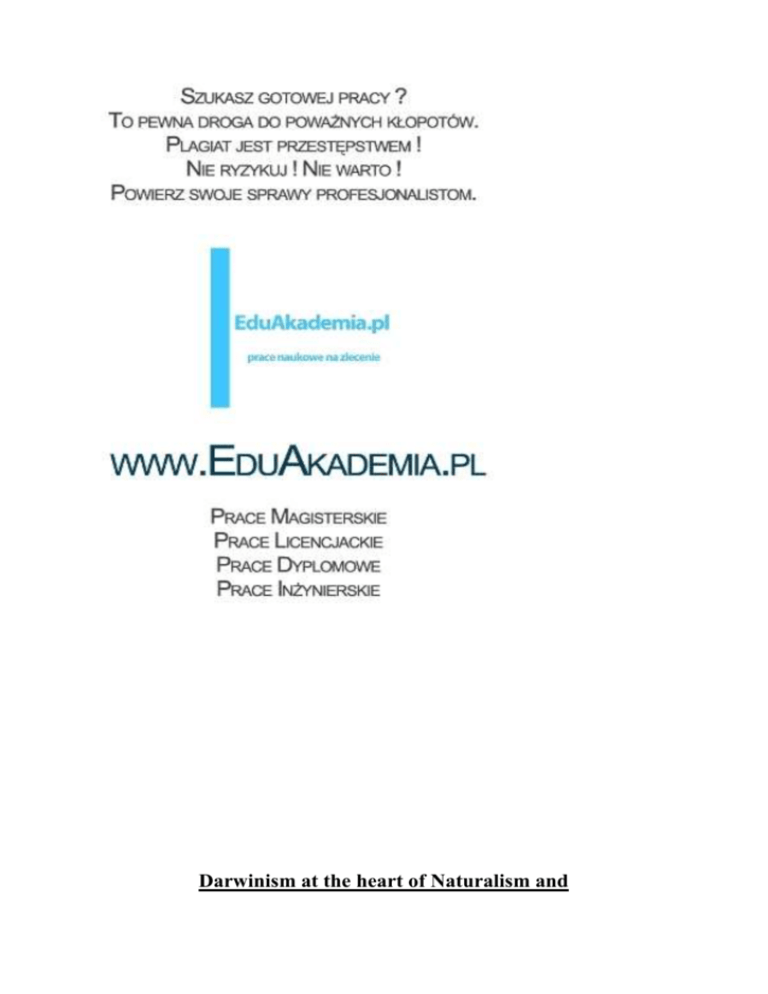
Darwinism at the heart of Naturalism and 2 its influence on Jack London There are three major vexations of mankind: Copernicus showed that the Earth is not the center of the universe; Freud discovered the subconscious and its major influence on the rational self; and Darwin found out that human beings are descended from apes. Each of these thinkers changed the very way to view the world. The impact on the centuries to follow was enormous. But what can be said about the period they lived in? It is true that their influence was so overpowering that it spread from the field they worked in to almost any other. 3 This research paper picks out Darwin‘s impact on the way to look at life, nature and religion which was indeed paramount. Before he published his famous "On the Origins of Species" in 1859, life on Earth was seen as God's creation. Fifteen years later the great majority of leading biologists (and quite a number of non-biologists) was convinced that the theory of evolution explained satisfactorily life and its diversity without the need to postulate God. His influence on practically every other science, social life and arts was overwhelming. This new perspective was also adapted in literature as writers felt the need to write their works in accordance with these new facts. The topics they chose and how they set about it bear traces of Darwin’s new conception of the world. A new movement, - not surprisingly called naturalism -, evolved. Although philosophical and social factors shaped naturalism as well, it was the new theory of evolution that proved to be its core. That, among other aspects, made it different from realism, the movement dominant up to the 1890's. Beginning with an introductory short description of Darwinism and its effects on the way of thinking towards the end of the 19th century, the essay continues to show the main features of naturalism in opposition to realism. Holding the view that Darwinism is at the heart of naturalism this paper will show the Darwinian influence on two of the works of Jack London. This will not be done by referring to direct quotations from The Origin of Species, as these would be too specific biological, but instead by demonstrating that Darwinian key concepts reoccur in London's works. Darwin put forward a theory consisting of multiple smaller theories. One of these was the idea from Malthus of an ever growing population resulting in shortage of resources (like food). Darwin concluded that there must be a "struggle for survival" among individual lifeforms.1 These individuals show small differences, which he called "variation"2 originating in 1 Barrett, Paul & Freeman, R. The Works of Charles Darwin. Volume 16. The Origin of Species. (New York: New York University Press, 1988), see Chapter 3: Struggle for Existence. 4 heredited attributes. However, he had no idea how these variations worked out exactly, as he was not familiar with the works of Gregor Mendel, who discovered the laws of heredity; nevertheless Darwin had a wealth of evidence from animal breeders. In the struggle for survival therefore only the "best adapted", the "fittest" survived; This Darwin called "natural selection".3 Consequently evolution works out like this: Individuals were shaped through their parental inheritance and then put to test by their environment, thereby weeding out the weakest and worst adapted. Although Darwin's thoughts are based on two main principles, of variation and natural selection, his actual theory is six-fold. Postulates are: evolution, one common origin of all life-forms, natural selection, variation, gradual changes, and the multiplication of species. Darwin’s theory of evolution has several implications that reach far beyond the field of biology. In the first place it was a severe blow for Christian religion: "The Origin of Species came into the theological world like a plough into an ant-hill."4 Darwin postulates that species develop from other species, which implies that animal and plant life change over long periods of time. This requires that evolution reaches back some millions years, in contrast to the Christian Bible-based calculation of 6000 years. Darwin's theory allowed, to explain life mechanically rendering Creation unnecessary as an explanation. Subsequently, God the Creator could be doubted, too, although Darwin avoided any opinion on that matter. Darwin's theory stands contrary to the then accepted belief that science was nothing else but theology of nature (e. g. Paley), which is being always directed to a final and perfect end designed by God. The theory of evolution denies that. It relies on laws of probability and chance as such, putting an end to all teleological or finalistic interpretations of the world. 2 Barrett, see Chapter 1: Variation under domestication and Chapter 2: Variation under Nature. 3 Barrett, see Chapter 4: Natural Selection; or the Survival of the Fittest. 4 Leo J. Henkin, Darwinism in the English Novel 1860-1910. (New York: Russell & Russell, 1963) p. 62 5 In 1871 Darwin delivered the second blow on religion. He published "On the Descent of Man" putting forward his thesis that human beings are descendants from apes. Man was neither the "crown of creation" nor was he distinguished by God to govern the Earth. But if man was an animal, how could he have morality? Morality, it seemed, was an invention along with the idea of God; now at least old-fashioned or simply wrong. Although Darwin's very sharply denied that evolution took place outside biology followers were fast to assign the theory of evolution to other branches of science. This was easy enough to do as Darwin's theory was a powerful tool: it was universal and built on two simple principles: variation and natural selection. It could easily be applied to philosophy, sociology, geology and almost everything else:"Evolution, then, had invaded every branch of science, (...)"5 In literature not his theory itself, but its philosophical implications were absorbed. A new movement emerged –naturalism –, which is based upon Darwinism. Besides the naturalist movement the genre of science-fiction was directed to new forms and ideas; i.e. the future of mankind in terms of an "evolution". A perfect example are the works of the most prominent author, H. G. Wells. In 1895 Wells wrote The Time-machine, in which mankind falls apart into two separate species. In Men like Gods (1923) mankind has evolved into a superior race, which is socially perfectly balanced. There is neither war nor pollution. The opposite direction of evolution is examined in The Island of Dr. Moreau (1895). Animals learn the 'laws of men', but fall back into their 'lower animal existence' again. Civilization is forgotten and the beasts kill men. Claiming that Darwinism is at the heart of literary naturalism it is necessary to give an overview about literary naturalism as well as having done with Darwinism, in order to 5 Henkin, p. 9 6 understand the influence he had on Jack London. The connections between Darwinism and naturalism are the basis for understanding the Darwinist influence on Jack London. To define a literary movement has always been a difficult task and prone to invoke sharp criticism. This may be due to the general problem to sum up individual writers, whose works are often spread over decades, under one concept, in this case naturalism. Moreover, both realism and naturalism are also philosophical terms with different meanings. Two different views are held, some critics arguing that naturalism is only "pessimistic realism" or "deterministic realism" whereas others are stressing that "While realism, (...) has been confined in modern American fiction to a relatively minor role, naturalism, in its various interests and strategies, has continued to flourish."6 But as Pizer points out, a consensus emerged "...the historian can accept the premise that whatever was being produced in fiction during the 1870s and the 1880s that was new, interesting, and roughly similar in a number of ways can be designated as realism and that an equally new, interesting and roughly similar body of writing produced at the turn of the century can be designated as naturalism."7 Lehan agrees, insofar as naturalism is a set of certain ideas: "Is there a literary naturalism? The answer, I have argued, is yes, if we mean by this a spectrum of ideas controlled by a literary method but used variously by a group of writers who brought the doctrine into being."8 6 Donald Pizer (ed.), The Cambridge Companion to American Realism and Naturalism: Howells to London. (New York: Cambridge University Press, 1995) p. 13; he mentions Steinbeck, Dos Passos, and Saul Bellow as later examples 7 Pizer, p. 5 8 Lehan, Richard, The European Background. in: Pizer, The Cambridge Companion, p. 47 7 The dominant literary movement of the time and predecessor of naturalism was realism. In realism shifted the focus from the transcendental world predominant in Romanticism to here-and-now. One of the reasons for this development was rapid industrial growth from the 1870s onwards. Subsequently, social and economic problems of the middle class were at the center of attention. As more and more people were living in industrialised cities it is there that novels become increasingly located. Adapting to new circumstances was required and in realist literature characters developed and had to learn moral lessons; not to learn meant to fail. One example of failure is Editha in Howells Editha who does not realize even after her husbands death that war has nothing to do with glory. Both realism and naturalism share common features. The here-and-now, the disregard of the transcendental and the hero as a representative character of society are perhaps the most important ones. In contrast, the three main distinguishing features are pessimism, determinism, and Darwinism, which are discussed below in more detail. One root of the pessimistic outlook is that the initial optimistic view of scientific and material progress lost its dynamic. Pizer mentions an economic decline combined with spiritual malaise. The first negative effects of this could be recognized towards the end of the century, when poverty and corruption of society were felt first in the cities that had enormously grown: "...postwar industrialism lured people from farm to town (...) Americans were adapting to assembly lines and horsecars, electric lights and apartment houses."9 This process took on faster and faster: "They [the naturalists] recognized that industrialism and urbanism, now clearly irreversible, were accelerating; iron mills had expanded into steel mills run by corporations ..."10, creating problems on their way. 9 10 Budd, Louis J. The American Background. in: Pizer, The Cambridge Companion, p. 33 Budd, p.42 8 Society and cities in particular were soon regarded as "inherently evil", the people living there as corrupted. It is held that civilization itself is rotten, as symptoms like alcoholism and prostitution show. As a result naturalist authors tend to be more concerned about poverty and injustice done to the lower classes than about the newly emerged and wealthy middle class. But as we notice in the short story The Outcast of Poker Flat this is not seen as the individual’s, but society’s fault, as a gambler and a prostitute (who are the outcasts) are the most noble and self-sacrificing characters. This pessimism often combines with determinism, being the period’s dominant philosophical mood: "Individual characters were seen as helpless products of heredity and environment, motivated by stong instinctual drives from within and harassed by social and economic pressures from without."11 The quote indicates how Man was thought to have almost no control over his life and therefore felt "helpless" to change his fate. Undoubtedly the father of literary determinism is Émile Zola who wrote the famous essay "Le Roman éxperimental", in which Zola defines the social process as a product of heredity and environment: "Émile Zola heralded a new fiction of determinism – of characters 'completely dominated by their nerves and blood, without free will' "12. Naturalism due to its strong deterministic features is amoral, in contrast to realism. The realist novel had the hero's moral choice at its center, but this has now changed. "Naturalism differed from realism in its assumption of scientific determinism, which led naturalistic authors to emphasize man's accidental, physiological nature rather than his moral or rational qualities."13 11 www.britannica.com ( -> pessimism) 12 Lee C. Mitchell, Determined Fictions: American literary naturalism. (New York: Columbia University Press, 1989) p. vii 13 www.britannica.com ( -> naturalism) 9 Concepts like free will and 'choice' have become absurd because "The critical and evolutionary philosophers of the nineteenth century saw man as struggling under a burden of received dogma (...) that crushed the spirit of freedom."14 Nature is indifferent to man; as shown in Crane's short story, The Open Boat, in which the youngest and strongest man drowns, although having done the most to ensure the survival of the people in the boat. But the amoral and determined world put naturalist writers in a dilemma. Novels as such have become pointless, if we perceive novels as usually having a problem at the center to be solved (often by a moral decision). But writers made exceptions, as they could not believe altogether in human robots with no free will at all. "If all process material or chemical, capable of being scientifically charted and described, then it follows logically that man's free will and moral responsibility, under the old dispensation, no longer exists. But the impact of this scientific revolution was not logical at this point."15 The scientific revolution mentioned in the quote above had Darwinism at its core and his impact stretched far into literature. "Literary naturalism derives mainly from a biological model. Its origin owes much to Charles Darwin and his theory of evolution, based in turn on his theory of natural selection. Darwin created a context that made naturalism – with its emphasis upon theories of heredity and environment – a convincing way to explain the nature of reality for the late nineteenth century."16 14 Charles C. Walcutt(ed.), Seven Novelists in the American Naturalist Tradition: An Introduction. (Minneapolis:University of Minnesota Press, 1963) p. 6 15 Walcutt, p. 8 16 Lehan, p. 47 10 The Encyclopedia Britannica confirms Richard Lehan's perception defining naturalism as a "...movement that was inspired by adaptation of the principles and methods of natural science, especially the Darwinian view of nature, to literature and art."17 It might be argued that that Darwinism includes pessimism and determinism. The determination of living beings is confirmed by both postulates hereditary inheritance and environment's great impact. The outcome was a resulting pessimistic world view, as determinism always has the conotation of resignation and fatalism: “The serene cosmic pattern was replaced by the blind movement of mindless forces (...)"18 Having stated that Darwinism is at the heart of naturalism and given the critic's consensus that Jack London is a naturalistic writer, it should be possible to find at least traces of a Darwinian world view in his works. In fact London embraced Darwinism wholly, which is evident in both his novels and letters, and when going to Klondike in 1897, London had taken a copy of The Origin of Species with him. In contrast to other critics Wilcox sees certain difficulties concerning the question of London being a naturalist writer: "Two problems arise from the assertion that Jack London was a literary naturalist: lack of common agreement on a definition of the term 'literary naturalism' and the need to demonstrate the precise ways in which London's fiction can be called 'naturalistic'."19 The first problem Wilcox mentions is dealt with in the preceding paragraphs in which it was shown that Pizer, Lehan and others critics held the view that there is indeed something like naturalist writing sharing features like pessimism, determinism and Darwinism. 17 www.britannica.com ( -> naturalism) 18 Cynthia E. Russett(ed.), Darwin in America: The Intellectual Response 1865-1912. (San Francisco: W. H. Freeman and Company, 1976) p. 3 19 Jacqueline Tavernier-Courbin (ed.), Critical Essais on Jack London. (Boston: G. K. Hall & Company, 1983) p. 105 11 Whether or not London's works can be called naturalistic can be affirmed positively by a wealth of evidence. Wilcox himself states that London's work comprises the following key concepts: sociological and biological determinism, survival of the fittest, belief in the materialistic, primitivistic nature of man; reformatory and anticapitalistic ideas, revolutionary themes; and an implicit belief in determinism in all these forces. So, two of naturalism's three main distinguishing features can be found even there; determinism and Darwinism. I want to focus on Darwinian influences and like to demonstrate by examples in The Call of the Wild and White Fang, that both novels rely very heavily on Darwin's theory of evolution "His [London's] concepts are earnestly Darwinian (...)"20. Although London's autobiographers agree that he often mixed up scientific theories or that he knew only the popularized versions, his knowledge of Darwin was profound: "He was so familiar with Darwin, for example, that he could quote whole passages of his work from memory."21 London himself says: “ I’ll name my teachers as Darwin, Huxley, Spencer, and all the school of evolutionists, (…)”22 Besides Darwin it is Herbert Spencer for whom Jack London had a lifelong admiration. Spencer understood evolution as a more general principle than Darwin and applied it foremost to society. Wilcox points out that London firmly believed in determinism thus sharing with other naturalist writers the dilemma of determinism and morality (free will). In two of his most famous novels, The Call of the Wild and White Fang he solves that problem with a stroke of genius: the protagonists are dogs. The significance is clear: animals are determined, but of course do not possess free will or have a moral choice like human beings do. But even then 20 Walcutt, p. 16 21 Russett, p. 175, see also Labor, Earle (ed.) The Letters of Jack London. Volumes I-III. (Stanford: Stanford University Press, 1988) p. 1105, where London demonstrates his astonished friends that he knows Darwin’s On the Origin of Species almost by heart. 22 Letters, Volume II, p. 962, see also p. 1498, where he calls them his “heroes” 12 London is forced to somehow bring back morality in the novels, 'betraying' Darwinian principles: "The naturalist often describes his characters as though they are conditioned and controlled by environment, heredity, instinct, or chance. But he also suggests a compensating humanistic value in his characters or their fates which affirms the significance of the individual and of his life."23 When looking at the novels the first thing to note is that both play in Alaska. London was convinced that there are two basic contradicting ways of life: civilization and the wilderness. The wilderness strips off the veneer of civilization being the only place where the law of nature is valid. Man and animals are reduced to their instincts to survive whereas cities are places allowing the weak to get along invalidating the laws of evolution. Interestingly enough in both plots inherent is a Darwinian concept, that of species transformation over long periods of time. Jack London takes up this idea, and quite wrongly according to Darwin, exemplifies it the one way with Buck, the hero of The Call of the Wild (he goes the way from a tame, civilized dog to a wild wolf), and the other way with White Fang, who is born wild and is tame in the end. London apparently thought: "Let the pressure be one way and we have atavism – reversion of the wild; the other domestication, civilization."24 Buck's life is an ethical retrogression; he lives a life of luxury in a southern civilized American city. He is caught and brought to Alaska to serve as a sled-dog. We witness his 23 Pizer, Donald (ed.). Realism and Naturalism in Nineteenth Century American Literature. (Carbondale and Edwardsville: Southern Illinois Press, 1984) p. 11 24 Russett, p. 124 13 submission to the code of violence and toil, a sort of de-initiation, forcing him to give up his sense of morality: "This first theft marked Buck as fit to survive in the hostile Northland environment. It marked his adaptability, his capacity to adjust himself to changing conditions, (...). It marked, further, the decay or going to pieces of his moral nature, a vain thing and a handicap in the ruthless struggle for existence. It was all well enough in the Southland, under the law of love and fellowship, to respect private property and personal feelings; but in the Northland, under the law of club and fang, (...) he would fail to prosper."25 This passage is also a prime example for practically direct quotations from Darwin using key terms of the theory of evolution like: fit to survive, adaptability, struggle for existence.26 Buck survives, and adapts to the wilderness in a long hard learning process. This is only possible as he remembers his ancestors, living on in his instincts. "And not only did he learn by experience, but instincts long dead became alive again. The domesticated generations fell from him."27 The duality of heredity, i. e. domesticated generations, and the influence of the environment, i. e. experience, is apparent in this quote. The second chapter "The Law of Club and Fangs" ends with a paraphrase for the children of Manuel, the servant who sold Buck, as "...divers small copies of himself."28 Again, 'copies of himself' is a term taken from reproduction, essential in the theory of evolution. After Buck has learned the basic skills of survival he takes over the leadership of the pack of sled-dogs. The lead dog Spitz is killed by him and London describes Buck as the "dominant primordial beast who had made his kill and found it good."29 indicating that killing 25 Jack London, The Call of the Wild and White Fang. (New York: Washington Square Press, 1962) p. 21 26 Barrett, see Chapter 4: Survival of the Fittest, Chapter 3: Struggle for Existence. 27 London, p. 22 28 London, p. 23 29 London, p. 39 14 is neither wrong nor bad, but rather a necessity in nature where only the strongest survive, reminding of the famous slogan "Nature, red in tooth and claw". After being sold Buck to unexperienced owners who do not know in the least how to manage dogs, sled or even the very journey itself they embark on. Jack London stresses again and again their clumsiness, making mistakes over mistakes, while not heading advice from others. It becomes clear that these human beings are unfit: "They did not know how to do anything, and as the days went by it became apparent that they could not learn."30 This is the worst sin a realist character can commit and as learning is much the same as adapting to different circumstances it can be argued that it is still one of the worst things not to be able to adapt in naturalism. So, not surprisingly they die breaking through thin ice and drown. They pass quickly out of the story with London writing only about the hole in the ice and Thornton's pitying words to Buck: "You poor devil." There is a complete lack of sympathy for these three human beings. In London's view they were unfit, therefore having no right to exist being useless for nature. In the following chapters of the novel Buck develops deep emotions for his master. That a dog feels passions like love or mourning just like a human being contradicts the Darwinian model (or general biological model) of the animal world but is a essential for the writer in constructing vivid characters. Buck regaines his strength being 'reborn' in the spring. He is reborn also in the sense of learning to love his master Thornton, who saved him from certain death. "Love, genuine passionate love, was his for the first time."31 London establishes that when Buck saves Thornton from drowning and again when winning 1600 Dollars by pulling a sled of 1,000 kg weight. But the last tie to civilization is broken (the bond of love) when 30 London, p. 58 31 London, p. 69 15 Buck's master dies. In that moment he resembles closely a human being in his feelings, as he notices the void in him, where once the love for Thornton resided. Buck finds himself free to answer the "Call of the wild". The call of the wild reminds him "He was a killer, a thing that preyed, living on the things that lived, unaided, alone, by virtue of his own strength and prowess, surviving triumphantly in a hostile environment where only the strong survive."32 He joins a pack of wolves and is finally transformed into the immortal Ghost Dog; However, even then he is bound to the world of his ancestor wolves:" ...but behind him were the shades of all manner of dogs, half-wolves and wild wolves, (...)"33 This backward transformation into a wolf is clearly inspired by Darwin's concept that species transform into new species. This is particularly apparent with dogs, which are nothing else than domesticated wolfs. The 'companion' of The Call of the Wild is White Fang, describing the reverse process, that is the transformation of a wolf into a dog. Its plot, written in 1906, is in contrast a 'proper' initiation story (ordeal, transformation, integration). White Fang is a wolf , who is one-fourth dog and three-fourth wolf. The novel starts way before his birth, with two wolves fighting for the she-wolf. As one rival dies in the fight for her as a partner to reproduce, London writes that "...this was the love-making of the Wild, the sex-tragedy of the natural world that was tragedy only to those that died."34 The indifference she shows to his death can often be found in London as he agrees on the Darwinian thought that while the fittest survive the the weakest (worst) will die, rendering pity inadequate, 32 London, p. 91 33 London, p. 72 34 London, p. 142 16 because nature defined them to be worthless. "The weakest and the most worthless were eaten first."35 White Fang is born in the wild, where he has to learn to survive. Three cubs die of hunger and the father is killed by a lynx, which is another good example for "only the strong survive", and the "struggle for existence". Fang learns the law of meat "The aim of life was meat. Life itself was meat. Life lived on life. There were the eaters and the eaten. The law was: EAT OR BE EATEN."36 Again, this is pure Darwinism showing the well –known model of predator and prey, which in this particular formula resembles closest the fight for resources and the resulting struggle for survival.37 This struggle has a very logical structure: "White Fang knew the law well: to oppress the weak and obey the strong."38 Another major point in London's two novels is the frequently mentioned 'awakening' or 'remembering' of instincts.39 This thought was first put forward by Lamarck, who believed that the modifications and experiences in the life-time of an animal can be passed on by their descendants. Interestingly Darwin inclined to accept this wrong idea, however with certain provisos.40 For example the father of White Fang finds himself in a new situation created by new instincts he cannot ignore:"The urge of his awakened instinct of fatherhood was strong upon 35 London, p. 231 36 London, p. 180 37 Barrett, see Chapter 4: Survival of the Fittest. 38 London, p. 219 39 Barrett, see Chapter 8: Instinct. 40 It was August Weissman who put forward his germ-to-germ theory in 1882, which is accepted up to today. 17 him. He must find meat."41 Instincts, too, rule White Fang's fear: "Yet fear was in him. It had come down to him from a remote ancestry through a thousand thousand lives."42 London also returns repeatedly to the idea of heredity, one of the two basic evolutionary principles.43 "The spell of the cub's heritage was upon him, the fear and the respect born of the centuries of struggle and the accumulated experience of the generations."44 White Fang's inheritance is obvious: "He was a carnivorous animal. He came of a breed of meat-killers and meat-eaters."45 but like Buck he is transformed by men and nature as far as his inheritance allows: "The clay of him was so molded."46 The heroes of London's two novels are always caged in between heredity and environment, a veritable prison. "...while his character was developing along the lines laid down by his heredity and his environment."47 As a result there is no place for morality or free will, which is exactly what we find in the Darwinian theory of evolution. Probably not for human beings and certainly not for animals. White Fang's development into a fighting machine is caused by his environment, i. e. the dogs and Beauty Smith. Later in the novel this is mentioned again: "They were his environment, these men, and they were molding the clay of him into a more ferocious thing than had been intended by Nature."48 What London called mo[u]lding Darwin 41 London, p. 153 42 London, p. 163 43 Barrett, see Chapter 1: Variation under domestication - Inheritance. 44 London, p. 183 45 London, p. 159 46 London, p. 238 47 London, p. 230 48 London, p. 258 18 called adaptation, which, later on, London uses, too:"Not only was White Fang adaptable by Nature (...)"49 White Fang then goes back the long road from wild wolf to tame 'dog', relearning with the help of his loving master. The last station is a city in California (civilization), where he heroically saves the family of his master. Towards the end of the novel the father of Weedon Scott expresses that by stating "You can never cure a chicken-killer (...)"50, meaning that the very nature of an animal cannot be changed. However, Weedon Scott succeeds in doing exactly this, as White Fang loves him. Of course this is utter nonsense in Darwinian terms, but London is forced to bring back morality and emotions like love somehow back into the novel to make the protagonist likeable. This allows the 'killer'-wolf to ignore boys flinging stones at him whereas in the Wild he would have killed them instantly; in civilization with his master Scott this has changed "Here he was compelled to violate his instinct of self-preservation, and violate it he did, for he was becoming tame and qualifying himself for civilization."51 In contrast, some human beings, like Beauty Smith are not qualifying for civilization, but are pictured as beasts and animals. The end is classically 'Darwinian', as White Fang mates and his offspring is born, because that is the only thing every living being is here for: reproduction.52 49 London, p. 309 50 London, p. 316 51 London, p. 319 52 Barrett, see Chapter 3: Struggle for Existence – Geometrical ratio of increase and Rapid Increase of naturalized animals and plants. 19 Having looked at two novels with animals as protagonists an interesting question remains: how did London apply Darwinian concepts to the human world. A look at the short story The Law of Life convinces us that the same rules are employed. Old Koskoosh is going to die and although this is the 'Law of Life' and described as natural and inevitable, the story is very sad. At the very end Koskoosh gives up the fight for his life in desperation and resignation: "What did it matter after all? Was it not the law of life?"53 In this story we find some of the last consequences for a human world building on the theory of evolution: its cruelty and heartlessness. For human beings there is only desperation left about laws like 'the weakest have to die'. In Londons’s words: “[human beings and life in general] …must yield to law – to LAW, inexorable, blind, unreasoning law, which has no knowledge of good or ill, right or wrong; (…)”54 A deep resignation is the result of the understanding that in our world there is no place for fair play or justice. Natural selection is “undeviating, pitiless, careless”55 In this particular way Darwinism paves the way to an amoral, mechanistic and senseless world view for the centuries to come. Bibliography Budd, Louis J. The American Background. in: Pizer, Donald (ed.), The Cambridge Companion to American Realism and Naturalism: Howells to London. New York: Cambridge University Press, 1995. Barrett, Paul & Freeman, R. The Works of Charles Darwin. Volume 16. The Origin of Species. 53 London, The Law of Life, p. 38 54 Letters, Vol. I, p. 89 55 Letters, Vol. I, p. 101 20 New York: New York University Press, 1988. Henkin, Leo J. Darwinism in the English Novel 1860-1910. New York: Russell & Russell, 1963. Labor, Earle (ed.) The Letters of Jack London. Volumes I-III. Stanford: Stanford University Press, 1988. Lehan, Richard The European Background. in: Pizer, Donald (ed.). The Cambridge Companion to American Realism and Naturalism: Howells to London. New York: Cambridge University Press, 1995. London, Jack The Call of the Wild and White Fang. New York: Washington Square Press, 1962. London, Jack The Law of Life. Handout. Mayr, Ernst ...und Darwin hat doch recht: Charles Darwin, seine Lehre und die moderne Evolutionstheorie. München: R. Piper GmbH & Co. KG, 1994. Mitchell, Lee C. Determined Fictions: American literary naturalism. New York: Columbia University Press, 1989. Pizer, Donald (ed.). The Cambridge Companion to American Realism and Naturalism: Howells to London. New York: Cambridge University Press, 1995. Pizer, Donald (ed.). Realism and Naturalism in Nineteenth Century American Literature. Carbondale and Edwardsville: Southern Illinois Press, 1984. Russett, Cynthia E. (ed.) Darwin in America: The Intellectual Response 1865-1912. 21 San Francisco: W. H. Freeman and Company, 1976. Tavernier-Courbin, Critical Essais on Jack London. Jacqeline (ed.) Boston: G. K. Hall & Company, 1983. Wilcox, Carl J. xxx in Critical Essais on Jack London. Tavernier-Courbin, Jacqeline (ed.), Critical Essais on Jack London. Boston: G. K. Hall & Company, 1983. Walcutt, Charles C (ed.). Seven Novelists in the American Naturalist Tradition: An Introduction. Minneapolis: University of Minnesota Press, 1963.
